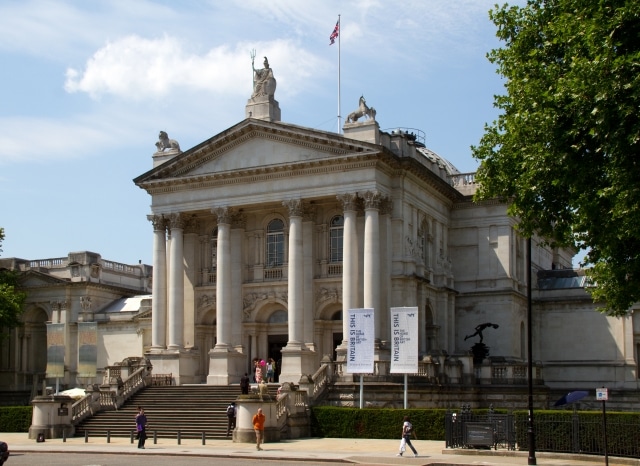Art lovers visiting Tate would have to donate less than 1p to allow the galleries to drop oil company BP as a sponsor, according to figures released today following a Freedom of Information request.
Sponsorship figures released today show that BP donations increased from just £150,000 in 1991 to only £330,000 in 2006 – less than 0.5 percent of Tate’s overall operational budget during that time.
The donations, which continue today, mean BP has its flower petal logo hanging around the gallery and, according to campaigners at Platform, provides them with a ‘social licence to operate’ by making them appear socially conscious and respectable.
The sponsorship figures were released after the Information Tribunal ruled in December that Tate galleries must disclose the controversial sum of money BP paid as a sponsor between 1990 and 2006.
The landmark ruling was the result of a three-year long Freedom of Information appeals process by London-based campaign group Platform, information charity Request Initiative and law firms Leigh Day and Monckton chambers.
Embarrassingly Small
Brendan Montague, Request Initiative co-founder and DeSmog UK editor, said: “Tate Britain and Tate Modern had a combined visitor-ship of more than 2.6m people during 2013. We estimate that if every 20th visitor donated just £0.01, enough money would be raised to make Tate BP-free.”
Anna Galkina from Platform said: “The BP sponsorship figures are even lower than we had estimated. For nearly a decade, Tate provided a veneer of respectability to one of the world’s most controversial companies for just £150,000 a year.
“The figures are embarrassingly small for Tate to go on justifying its BP relationship. BP desperately needs the ‘social licence’ provided by cultural sponsorship in order to continue trashing our climate. But Tate can clearly do without BP.”
Tate renewed BP’s sponsorship contract for five years in 2011, a year after BP’s Deepwater Horizon spill. As Director Nicholas Serota commented at the time: “You don’t abandon your friends because they have what we consider to be a temporary difficulty.”
Reputational Risk
However, the newly revealed minutes of Tate’s Ethics Committee – released with the sponsorship figures – show some scrutiny of the legal cases against BP as a result of the spill as well as BP’s Canadian tar sands projects.
The minutes state: “Tate has taken a public stance on sustainability and is arguably the cultural institution most in the public eye in the UK. In light of this the reputational risk to Tate of retaining BP as a partner is significant.”
It added that the “oil and gas industry is appearing as the recipient of public scrutiny, disapproval and negativity, in the same way as the tobacco industry was in the 1990s”.
Yet the Ethics Committee concluded that “taking a moral stance on the ethics of the Oil and Gas sector … is outside of Tate’s charitable objectives” and that the benefits of BP’s support for Tate “far outweigh any quantifiable risk to our reputation”.
“Tate has fought and no doubt spent a large amount of money trying to keep this information secret,” said Rosa Curling, solicitor of Leigh Day who has been working on the case.
“If public bodies are accepting sponsorship money from corporations such as BP, they must be open about how much they are receiving. Tate’s actions have prevented proper public debate over the acceptability of the sponsorship, based on actual figured, for over three years.”
She added: “We hope that Tate will now change its approach and act in a more open and transparent manner about corporate sponsorship from now on.”
Photo: Magnus Manske via Creative Commons
Subscribe to our newsletter
Stay up to date with DeSmog news and alerts







